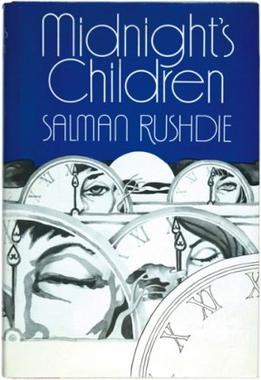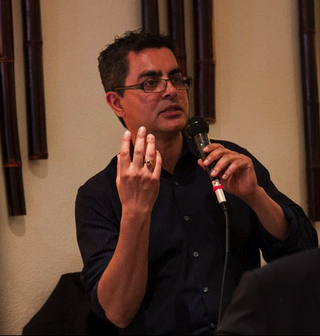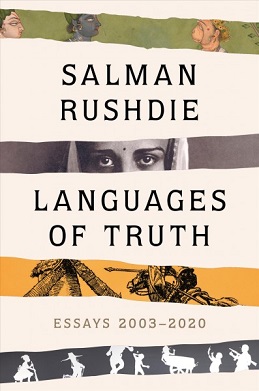
Sir Ahmed Salman Rushdie is an Indian-born British-American novelist. His work often combines magic realism with historical fiction and primarily deals with connections, disruptions, and migrations between Eastern and Western civilizations, typically set on the Indian subcontinent. Rushdie's second novel, Midnight's Children (1981), won the Booker Prize in 1981 and was deemed to be "the best novel of all winners" on two occasions, marking the 25th and the 40th anniversary of the prize.

Sir Kazuo Ishiguro is a Japanese-born British novelist, screenwriter, musician, and short-story writer. He is one of the most critically acclaimed and praised contemporary fiction authors writing in English, having been awarded the 2017 Nobel Prize in Literature. In its citation, the Swedish Academy described Ishiguro as a writer "who, in novels of great emotional force, has uncovered the abyss beneath our illusory sense of connection with the world".

Midnight's Children is a 1981 novel by Indian-British writer Salman Rushdie, published by Jonathan Cape with cover design by Bill Botten, about India's transition from British colonial rule to independence and partition. It is a postcolonial, postmodern and magical realist story told by its chief protagonist, Saleem Sinai, set in the context of historical events. The style of preserving history with fictional accounts is self-reflexive.

The Satanic Verses is the fourth novel of British-Indian writer Salman Rushdie. First published in September 1988, the book was inspired by the life of the Islamic prophet Muhammad. As with his previous books, Rushdie used magical realism and relied on contemporary events and people to create his characters. The title refers to the Satanic Verses, a group of Quranic verses about three pagan Meccan goddesses: Allāt, Al-Uzza, and Manāt. The part of the story that deals with the "satanic verses" was based on accounts from the historians al-Waqidi and al-Tabari.

Amitava Kumar is an Indian writer and journalist who is Professor of English, holding the Helen D. Lockwood Chair at Vassar College.

Shalimar the Clown is a 2005 novel by Salman Rushdie. The novel took Rushdie four years to write, and was initially published on 6 September 2005 by Jonathan Cape. Shalimar the Clown derives its name from Shalimar Gardens, in the vicinity of Srinagar. Srinagar is one of several Mughal Gardens, which were laid out in several parts of undivided India when the Mughals reigned over the subcontinent. Shalimar is also the name of one of the characters featured in the novel. Shalimar the Clown won the 2005 Vodafone Crossword Book Award and was one of the finalists for the 2005 Whitbread Book Awards.

The Satanic Verses controversy, also known as the Rushdie Affair, was a controversy sparked by the 1988 publication of Salman Rushdie's novel The Satanic Verses. It centered on the novel's references to the Satanic Verses of the Quran, and came to include a larger debate about censorship and religious violence. It included numerous killings, attempted killings, and bombings by perpetrators who supported Islam.

Wizard of the Crow is a 2006 novel written by Ngũgĩ wa Thiong'o and translated from the original Kikuyu into English by the author, his first novel in more than 20 years. The story is set in the imaginary Free Republic of Aburĩria, autocratically governed by one man, known only as the Ruler. The novel received the 2008 Tähtifantasia Award for the best foreign fantasy novel released in Finland in 2007.

Aminatta Forna, OBE, is a Scottish and Sierra Leonean writer. She is the author of a memoir, The Devil That Danced on the Water: A Daughter's Quest, and four novels: Ancestor Stones (2006), The Memory of Love (2010), The Hired Man (2013) and Happiness (2018). Her novel The Memory of Love was awarded the Commonwealth Writers' Prize for "Best Book" in 2011, and was also shortlisted for the Orange Prize for Fiction. Forna is Professor of Creative Writing at Bath Spa University and was, until recently, Sterling Brown Distinguished Visiting professor at Williams College in Massachusetts. She is currently Director and Lannan Foundation Chair of Poetics of the Lannan Center for Poetics and Social Practice at Georgetown University.
Hatchet Job of the Year was a British journalism award given annually from 2012 to 2014 to "the writer of the angriest, funniest, most trenchant book review of the past twelve months". It was awarded by The Omnivore, a review aggregator website, with the aim to "raise the profile of professional critics and to promote integrity and wit in literary journalism". The prize was a year's supply of potted shrimp.

The Orchard of Lost Souls is a 2013 novel by the Somali-British author Nadifa Mohamed. It is set in Somalia on the eve of the civil war. Her second book, coming four years after her award-winning debut work Black Mamba Boy (2009), it was published by Simon & Schuster.

The Tailor of Panama is a 1996 novel by British writer John le Carré. A 2001 film was released based on the novel.

Ancestor Stones is a 2006 novel by Aminatta Forna about the experiences of four women in a polygamous family in West Africa.

The Memory of Love is a 2010 novel by Aminatta Forna about the experiences of three men in Sierra Leone. In 2022, it was included on the "Big Jubilee Read" list of 70 books by Commonwealth authors, selected to celebrate the Platinum Jubilee of Elizabeth II.

The Hired Man is a 2013 novel by Aminatta Forna about an Englishwoman, Laura, and her two children who renovate a farmhouse in Croatia with the help of local handyman, Duro and the revealing of the recent history of the area.

Quichotte is a 2019 novel by Salman Rushdie. It is his fourteenth novel, published on 29 August 2019 by Jonathan Cape in the United Kingdom and Penguin Books India in India. It was published in the United States on 3 September 2019 by Random House. Inspired by Miguel de Cervantes's classic novel Don Quixote, Quichotte is a metafiction that tells the story of an addled Indian-American man who travels across America in pursuit of a celebrity television host with whom he has become obsessed.

Frankissstein: A Love Story is a 2019 novel by Jeanette Winterson. It was published on 28 May 2019 by Jonathan Cape. The novel employs speculative fiction and historical fiction to reimagine Mary Shelley's classic novel Frankenstein (1818). The story switches between Mary Shelley writing Frankenstein in Geneva, Switzerland in 1816 and the story of Ry Shelley, a transgender doctor and Victor Stein, a transhumanist, who become involved in the world of artificial intelligence and cryonics in present-day Brexit-era Britain.

The Last Gift is a novel by Abdulrazak Gurnah. It is Gurnah's eighth novel and was first published by Bloomsbury Publishing in 2011. The plot centres on Abbas, an immigrant from east Africa living in England, who reflects on his past after he has a stroke.

Languages of Truth is a collection of essays by Salman Rushdie. It was published in May 2021 by Random House.

On August 12, 2022, novelist Salman Rushdie was stabbed multiple times as he was about to give a public lecture at the Chautauqua Institution in Chautauqua, New York, United States. A 24-year-old suspect, Hadi Matar, was arrested directly and charged the following day with assault and attempted murder. Rushdie was gravely wounded and hospitalized. Interviewer Henry Reese was also injured by the attacker.


















